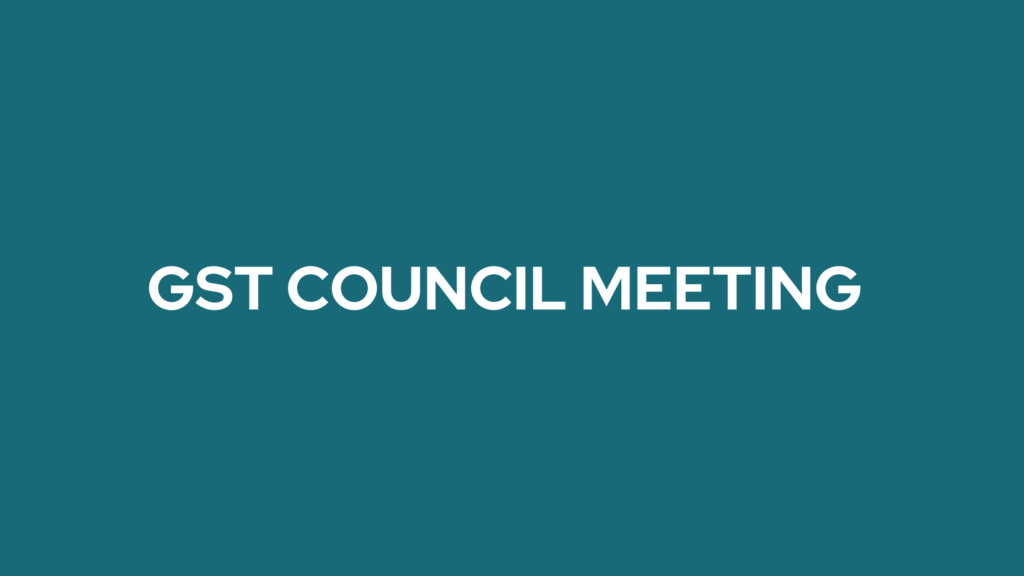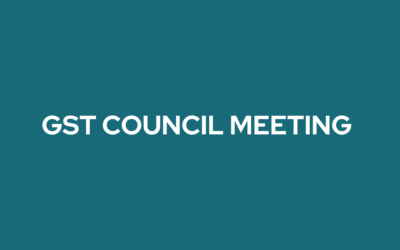28th GST Council Meeting – Highlights & Updates
Here the Complete information of 28th GST Council Meeting and Details
The Government has provided more information about the new mechanism of return filing in the 28th GST Council Meeting.This move by the Government will improve ease of doing business as 93% of the taxpayers have a turnover of less than Rs 5 Cr.
-
GST Returns of Small Taxpayers:
The GST Council has approved quarterly GST return filing for small taxpayers having less than Rs.5 crores of turnover. Quarterly return filing will be similar to the monthly return; however, GST payments would still have to be made monthly. Only small taxpayers making B2C supply or making B2B and B2C supply can enrol for quarterly GST return filing. Small taxpayers involved in only B2B supply cannot file quarterly returns under this scheme.
-
Simplified Monthly Returns:
The monthly returns that have to be filed by taxpayers has also been simplified. The new GST return would be simple with two main tables. In one table, the taxpayer shall report sales and in another report purchases for availing input tax credit. Invoices can now be uploaded continuously by the seller and continuously viewed and locked by the buyer for availing input tax credit.The process would be “UPLOAD – LOCK – PAY” for most taxpayers.
-
NIL Return Filing by SMS:
A new facility would soon be introduced by the GSTN wherein taxpayers can file NIL GST Return by simply sending an SMS.
-
GST Migration Re-opened:
Those businesses that had VAT or Service Tax or Central Excise registration were required to migrate and obtain GSTIN. This migration was also later closed. The 28th GST Council has now approved the proposal for opening the migration window for taxpayers, who received provisional IDs but could not complete the migration process. Those taxpayers who filed Part A of FORM GST REG-26, but not Part B can approach the jurisdictional Central Tax/State Tax nodal officers with the necessary details on or before 31st August, 2018 to complete the GST migration procedure. All such taxpayers who are now migrating will not be levied a penalty for late filing GST return. However, such taxpayers will have to file GST return first along with the payment of late fee. On filing the GST return, the GSTN would provide credit by way of a reversal of the amount paid as late fees in the cash ledger under the tax head.
-
GST Rate Changes:
Rate Reduction from 28% to 18%:
- Paints and varnishes (including enamels and lacquers)
- Glaziers’ putty, grafting putty, resin cement
- Refrigerators, freezers and other refrigerating or freezing equipment including water cooler, milk coolers, refrigerating equipment for the leather industry, ice cream freezer etc.
- Washing machines.
- Lithium-ion batteries
- Vacuum cleaners
- Domestic electrical appliances such as food grinders and mixers & food or vegetable juice extractor, shaver, hair clippers etc
- Storage water heaters and immersion heaters, hair dryers, hand dryers, electric smoothing irons etc
- Televisions up to the size of 68 cm
- Special purpose motor vehicles. e.g., crane lorries, fire fighting vehicle, concrete mixer lorries, spraying lorries
- Works trucks [self-propelled, not fitted with lifting or handling equipment] of the type used in factories, warehouses, dock areas or airports for short transport of goods.
- Trailers and semi-trailers.
- Miscellaneous articles such as scent sprays and similar toilet sprays, powder-puffs and pads for the application of cosmetics or toilet preparations.
Rate Reduction from 28% to 12%:
- Fuel Cell Vehicle. Further, Compensation cess shall also be exempted on fuel cell vehicle.
-
Footwear:
5% GST rate will now be applicable for footwear having a retail sale price up to Rs. 1000 per pair. 18% GST rate will be applicable for footwear having a retail sale price exceeding Rs.1000 per pair.
-
Refund of Accumulated Input Tax Credit:
GST is applicable on fabrics at the rate fo 5% subject to the condition that refund of accumulated ITC on account of inversion will not be allowed. However, considering the difficulty faced by the Fabric sector on account of this condition, the GST Council has recommended for allowing refund to fabrics on account of inverted duty structure. The refund of accumulated ITC would be allowed only with the prospective effect.

